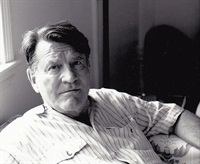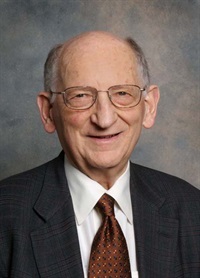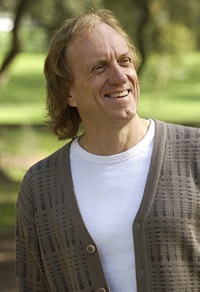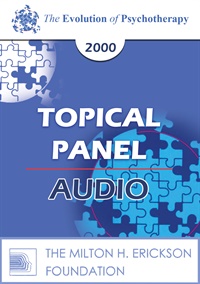EP00 Topical Panel 17 - Schizophrenia / Severely Disturbed Patients - Ray Corsini, PhD; Jay Haley, MA; Otto Kernberg, MD; Michael White, BASW
- Average Rating:
- Not yet rated
- Topic Areas:
- Topical Panels | Schizophrenia | Personality Disorders | Psychotherapy
- Categories:
- Evolution of Psychotherapy | Evolution of Psychotherapy 2000 | Pioneers in Couples and Family Therapy
- Faculty:
- Ray Corsini, PhD | Jay Haley, MA | Otto Kernberg, MD | Michael White, B.A.S.W.
- Duration:
- 53 Minutes
- Format:
- Audio Only
- Original Program Date:
- May 28, 2000
- License:
- Never Expires.
Description
Description: The panel presents approaches to treating schizophrenia with an emphasis on personalized care, collaboration with medication, and the use of psychotherapy. Techniques are discussed like revoicing auditory hallucinations aim to reduce vulnerability to psychotic episodes. Recovery data and the importance of psychosocial support and family involvement are also highlighted.
Moderated by Ruth McClendon, MSW.
Educational Objectives:
- To compare and contrast clinical and philosphical perspectives of experts.
*Sessions may be edited for content and to preserve confidentiality*
Credits
Handouts
| Timestamped Transcript (826.9 KB) | 18 Pages | Available after Purchase |
| Ericksonian Learning Snapshot (250.5 KB) | 2 Pages | Available after Purchase |
Faculty

Ray Corsini, PhD Related Seminars and Products
RAY CORSINI, Ph.D., was a retired Professor of Psychology, University of Hawaii. He had been in private practice for 35 years. Dr. Corsini has published over 60 books under 43 titles, including four encyclopedias and the most complete dictionary of psychology, and has written or edited 18 books in counseling or psychotherapy. He is listed in Who's Who in America, Contemporary Authors and the Biographical Dictionary of Psychology, 1997.
Raymond Corsini's training was diverse. He received a BA and MA at the City College of New York, then did his doctoral training at Syracuse University, Cornell University, University of California, University of Wisconsin (all during the time of his work as a prison psychologist), and finally obtained a Ph.D. at age 41 from the University of Chicago under Carl Rogers. He met and interacted with J.L. Moreno, Fritz Perls, Victor Frankl, and Albert Ellis among others, but his main teacher was Rudolf Dreikurs, an Adlerian. He had three separate careers: as a prison psychologist for 15 years, then an industrial psychologist for ten years, and finally in private practice of psychotherapy and counseling for 30 years. Usually in the summers, he taught courses at over a dozen universities and full time at the University of Chicago, Illinois Institute of Technology, and the University of California at Berkeley.

Jay Haley, MA Related Seminars and Products
Jay Haley (M.A., 1953, Stanford University) was Director of Family Therapy Institute of Washington, D.C. He was one of the leading exponents of the strategic/interpersonal approach to family therapy. Haley served as Director of the Family Experiment Project at the Mental Research Institute and as Director of Family Therapy Research at the Philadelphia Child Guidance Clinic. He has authoered seven books, co-authored two and edited five. Additionally, he has more than 40 contributions to professional journals and books. Haley is the former editor of Family Process, and the first recipient of the Lifetime Achievement Award of The Milton H. Erickson Foundation.

Otto Kernberg, MD Related Seminars and Products
Otto Kernberg, MD, is a psychoanalyst and professor of psychiatry at Weill Cornell Medical College. He is most widely known for his psychoanalytic theories on borderline personality organization and narcissistic pathology. Director of the Personality Disorders Institute at the New York Presbyterian Hospital, Westchester Division, and Professor of Psychiatry at the Weill Medical College of Cornell University. Dr. Kernberg is a Past-President of the International Psychoanalytic Association. He is also Training and Supervising Analyst of the Columbia University Center for Psychoanalytic Training and Research. Dr. Kernberg is the author of twelve books and co-author of twelve others. His most recent books are Psychotherapy for Borderline Personality: Focusing on Object Relations and Handbook of Dynamic Psychotherapy for Higher Level Personality Pathology.

Michael White, B.A.S.W. Related Seminars and Products
MICHAEL WHITE, B.A.S.W., is Director of Dulwich Centre, Adelaide, South Australia. He is engaged in the provision of therapeutic services, in teaching and supervision and in working with communities. He has published numerous articles and several books on the subject of narrative therapy.


